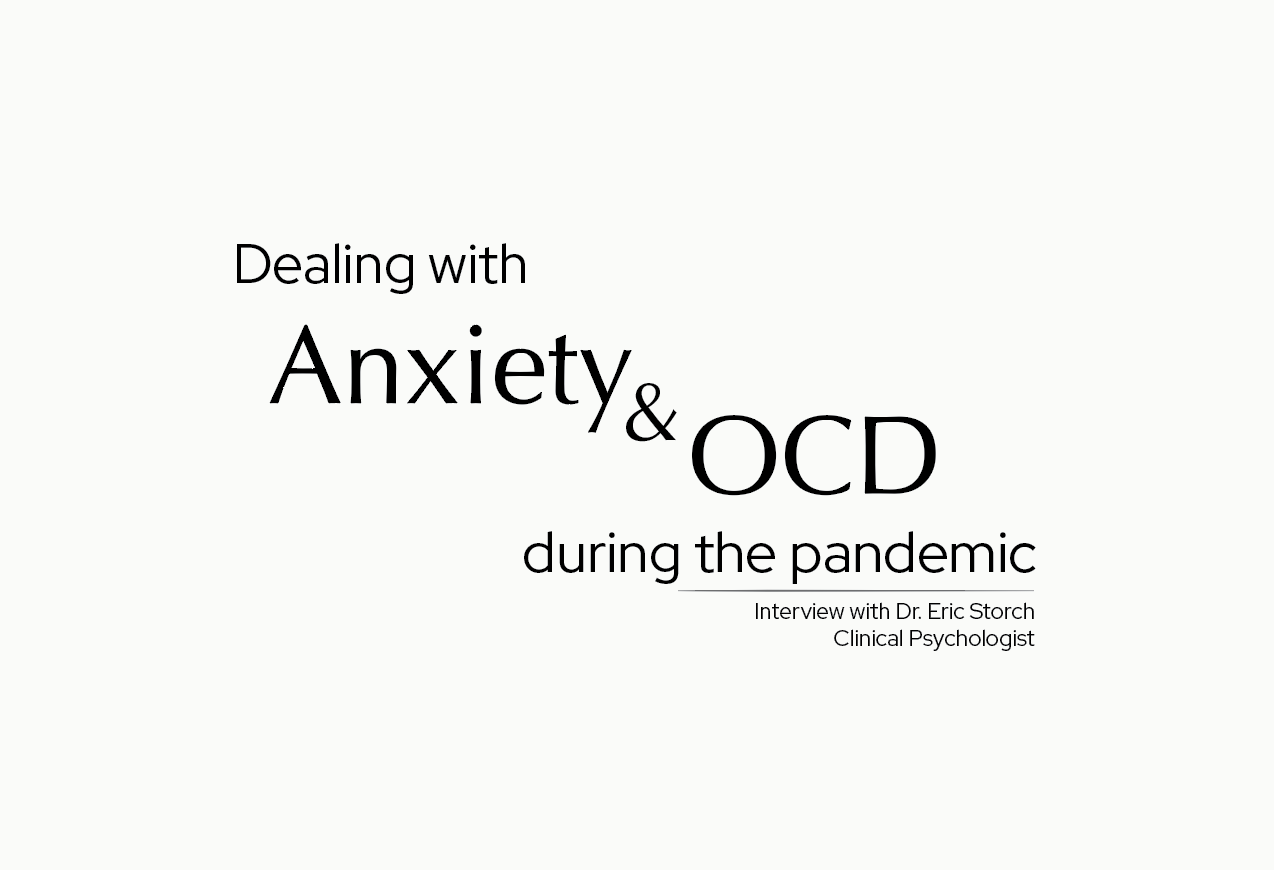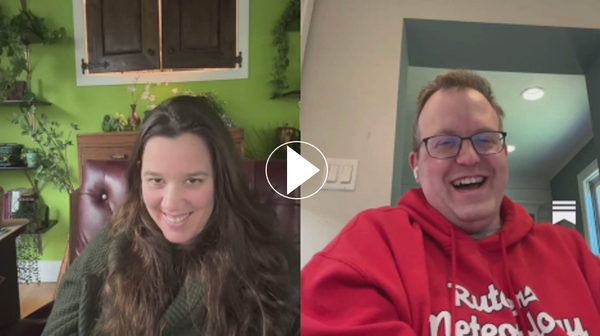Dealing with anxiety and OCD during the pandemic

Interview with Dr. Eric Storch, PhD
While this blog is usually focused on COVID-19 and helping debunk misinformation, this post is a different. For this post, I wanted to dive into one of the other major health crises caused by the pandemic: the profound impact on mental health.
I had the opportunity to talk with one of my research collaborators, Dr. Eric Storch, a clinical psychologist who specializes in treatment of anxiety and obsessive-compulsive disorder (OCD). We talked about the mental health challenges brought on by the pandemic, both for the general public and those with pre-existing mental health disorders like anxiety and OCD. It was one of the most helpful conversations I’ve had during the pandemic; I hope it helps you too!
What is Obsessive-Compulsive Disorder?
Before we get to the interview, a brief background on OCD. While anxiety is generally well understood, OCD is less so. Many think of OCD as more of a personality trait, describing people who need things to be perfectly straight or need everything to be ‘just so.’ But that does not accurately describe the disease. OCD is a mental illness that is deeply distressing and exhausting. It is defined by people who have obsessions (such as unrelenting fear that the front door may be unlocked, possibly leading to a break-in) followed by compulsions that aim to unsuccessfully relieve that fear (repeatedly checking the door is locked, over and over, to the point where they are late for work.) Obsessions and their corresponding compulsions may vary widely — some examples are obsessions about germs (triggering a compulsion of excessive hand-washing), obsessions of religious guilt (triggering compulsions of repeated prayer rituals), obsessions of accidentally causing harm to others (causing compulsions of re-driving routes, making sure they didn’t accidentally hit a pedestrian), obsessions about being in the wrong relationship (causing compulsions of excessively monitoring their feelings and comparing to other relationships), obsessions about accidentally harming a newborn child (causing compulsions of excessively checking on the baby in the middle of the night), and many others. One of my good friends is making a documentary on some of the lesser known subtypes of OCD; check out her video at the end of this post to learn more. Dr. Storch specializes in treating OCD patients, which often includes helping them directly confront their fears and obsessions through exposure therapy.
Interview has been edited for length and clarity.
Kristen: Hi Dr. Storch! Thank you so much for being the very first interviewee for my blog! So my first question is more general: what are the mental health issues that have become more common during the pandemic, and do you have any recommendations on how to help people deal with them?
Dr. Storch: So the first question is certainly a complex one. Broadly speaking, those people that have had a mental health problem, usually it’s gotten worse during the pandemic, and there have also been significant increases of mental health problems overall. So at a given point about one in five people are struggling with a mental health issue, and this has gone up to about three in ten to four in ten. The most common have been depression, anxiety, and substance abuse. And when I say substance abuse I’m not talking about sitting at home with your spouse and having a bottle of wine each night. I’m talking about real substance abuse, like real hard-core stuff. As for the depression and anxiety — I think that people aren’t able to cope the ways that they used to and they aren’t able to connect with people. Anxiety is very much about the uncertainty of the world, and in addition to the pandemic you layer on these issues with social justice and political division. I think a lot of these things have come together and made for a very difficult year. For kids, one of the things that, on top of those factors, came out was that we saw reductions in reporting of child abuse. And in spouses, particularly women, we saw increases in reports of domestic violence (DV). The increase in DV is attributable to the fact that for people in abusive relationships, they’re now around each other 24/7. But the child abuse stuff and the fact that reports are going down – this is because you aren’t seeing the kids at school or at the doctor. So you’re really relying on a parent to report it, to say ‘yeah I beat my kid’, or a kid directly saying it, which just doesn’t happen as much. So those are a couple other facets that have been really concerning over time. And then across all these, when there’s some sort of additional stressor, that makes it worse. So like if you lose a job, you have financial stressors or you are at risk for COVID yourself or get COVID, these stressors exacerbate the problem at hand. So I think the uncertainty associated with these additional stressors sort of dumped another gallon of gas on the fire… or you know, I think we’re passed just dumping gas, I think it’s really kind of blown up.
There have been some silver linings – for example, telehealth has improved access to mental health services. I mean think about — if you lived in rural Texas hours away from a hospital, you could still see me. And there’s some movement to deregulate some of the state licensing boards or state licensure to make it more national so that that expertise can cross state lines. So in the case of OCD, there aren’t enough providers at this point, so now we’re increasing access via telehealth and that’s a good thing. At the same time, some of the challenges still persist like not enough providers or how many providers actually take insurance. So, you know, I think that those problems are still in place and it won’t change anytime soon.
Another silver lining is we’re talking about mental health even more than we did a couple years ago, and it’s not simply because someone shot up a school; it’s because people are aware that people are struggling. So I think that’s another positive. But again for the interventional components, it’s all about identifying the issues and then reaching out, and I think telehealth has improved that in some regards. But at the same time for a lot of people it’s not a good fit — I mean for a young person who’s capable and tech savvy it’s fine, but for every 30-year-old out there there’s a 70-year-old out there trying to figure out zoom who’s like ‘how do I do this?’ So we have to think about social determinants of health, and tech is a social determinant of health.
Kristen: Absolutely. How about for people who deal with anxiety or compulsions, and now they’re living in this pandemic, do you have advice on how to help them decide if their response (i.e. sanitizing, wiping down everything) is an appropriate level of caution, or if they’re going overboard and can tell themselves ‘no I don’t need to scrub that for the fourth time?’
Dr. Storch: I think there are a few ways you can think about it. And the first is: ask if the response is getting in the way? Is it causing impairment? For example, no one likes wearing a mask… it’s not fun. But it doesn’t really impair us: it’s just sort of an annoyance. So this would be an example of an appropriate response that’s not overboard, as you’re still able to function. The second piece to consider is the level of distress the trigger causes you. When you come across the trigger (say, during the pandemic, a grocery order is delivered to your house), how does your response compare to other people you know? Do you wipe down every single item with Clorox wipes three times? This is a really important additional feature to consider. I always joke back in the day there were those ‘What Would Jesus Do?’ wristbands, and I like to encourage people to think about someone who is a steady solid person in their life and who responds to situations well, and ask yourself what they would do in the same situation. Let’s say that person’s name is Ben – so I tell them to look and see if Ben’s worried about a given situation and how he’s responding to it, and use that as a sort of barometer on whether or not they should be concerned or if their response is inappropriate. If Ben wouldn’t wipe down the groceries three times, then maybe that’s an overly cautious and unnecessary response. So it’s sort of comparing yourself to other people in terms of your level of distress and how that’s comparing to your barometer. It’s also important to appreciate that there is some natural variation in how people respond to situations, and that’s absolutely fine. But that’s when you go back to that notion of impairment and duress – ask yourself if this response is causing you significant impairment in your life.
Another point to consider is the context of where you are, and that things change based on context. For example, if someone’s at summer camp in East Texas, certain kind of standards of hygiene might be a little bit different than if someone is scrubbing in before a surgery, and that’s a good thing. And along those lines, inflexibility tends to characterize more distressing responses. For example, if someone has to wash their hands the same way before a meal as they would before a surgery, and they get really upset if they aren’t able to maintain that high level of cleanliness in every situation, it is in those moments where you might think something is amiss.
Kristen: That makes perfect sense. So it’s really that concept of excess that is key. So we’ve been talking about these more general, collective stressors like the pandemic, the political tension, the social justice issues, and I know for me those are the ones I’ve felt the most because I haven’t lost my job or gotten sick. But there are also the acute stressors, for example having a loved one die of COVID or losing a job – do you have a sense of what’s been the biggest driver of people’s general deterioration in mental health during the pandemic?
Dr. Storch: Yeah I think that the uncertainty is really a major driving force behind this. I think the most helpful kind of thing I might say is focus on trying to bring about certainty. So even when you think about OCD and anxiety, one of the driving factors is this aspect of doubt and uncertainty. So with anxiety, it might be ‘am I going to get a good job, and what if I don’t?’ It’s all about feeling uncertain if I will or won’t get it, and that makes me really uncomfortable. Or I’m not sure if my house will be broken into. And I think COVID has jumped on that anxiety surrounding uncertainty: how long will this go? Will we ever be able to see family again? Will my business stay afloat? Will my job be cut? All of these things come in and bring uncertainty. I think the best idea is to try to introduce certainty into your life as much as you can. For example, my wife would chew a lot on whether or not we should take a trip – say it was September and we were thinking maybe things will be different in November? They probably won’t, and instead of leaving it up in the air, to bring more certainty, just plan that they won’t be so that at least for that trip, the decision is certain.
Kristen: I really like that – do you have another example of how people can try to introduce certainty in their day-to-day lives?
Dr. Storch: So if you’re concerned that there may be financial ramifications, consider what can you do now to prepare for that. Maybe you kind of pull back on certain things and start saving a little bit of money. That would be one example. Or if you’re in one of these high risk groups, saying OK here are the things I can do to maintain safety. I think a lot of people take a passive approach, which problematic for folks because they’re making the decision to let something else make decisions for them, and that brings more uncertainty and stress. And ultimately you may be wrong, you may make the wrong choice and cancel a trip that didn’t need to be cancelled, but you made a choice still. All of the behavioral therapies that we do involves making a choice to confront as opposed to avoid. When you’re depressed and we’re doing something called behavior activation, it is making a choice to get out and be active, or confront a problem as opposed to avoiding it.
I think the other piece of learning how to cope effectively is finding meaning and perspective. There is old psychiatrist, now deceased, Viktor Frankl who was in the Holocaust. And I love his concept of in the face of unmovable obstacles, it’s about changing your perception of those obstacles and finding meaning in your response to them. So our entire world has been upended and so thinking about how do you arrive at meaning, how do you change the way you’re perceiving this in order to move forward. From the meaning standpoint, perhaps it’s that we did our small part – how we helped people.
Kristen: Man’s Search For Meaning by Viktor Frankl is one of my all time favorite books. (Everybody should read it.) So my last question — you’ve already touched on this a bit, but what are the most effective strategies for dealing with anxiety and stress during the pandemic? When I’ve googled this, all I find is stuff like breathing exercises and stuff like that, which… maybe that is helpful, but was hoping there was more than that. So what actually works?
Dr. Storch: If we’re talking clinically, I think one of the most effective tools is the idea of exposure. With exposure therapy all you’re doing is exposing people to the excessive and what doesn’t reflect reality. In the course of COVID, our risk level has gone up, so things we might not have previously had to do, now we have to do, so we tailor our treatment to current public health standards. Now what’s important is that for most people, their OCD isn’t centered around contamination stuff, and when it is, it’s really specific. We’ve had some folks where contamination OCD is all about COVID, but for the majority it’s not. It’s the same old stuff they had before the pandemic, for example… They’re worried that if they see a red spot, that’s blood, and they could get HIV from that. Now even when someone does have COVID-related OCD — your public health guidelines are really clear on what the appropriate response is: you wear a mask and social distance, and it’s the excess that’s really the problem. Going out and getting your groceries to go? Not excessive. Washing your hands after being outside? Not excessive. And we always want to target the stuff that’s in excess.
So to your question of what’s helpful, I think it’s really directly confronting the excessive, exaggerated triggers that are provoking anxiety. It’s all about learning, in essence, what is the feared outcome that I have? And that’s I think the key. It’s not about being reckless. For example, if someone is someone’s OCD is a fear of accidentally stabbing themselves with a hypodermic needle and contracting disease – when we say ‘confronting the fears’, we’re not going out and having them dip their hands in sharp boxes. We might go and touch the outside of a sharps box. But there’s a clear line between what’s actually dangerous and the hypothetical exaggerated danger that can trigger these excessive responses. And the second piece is to reflect on how you’re interpreting the world and tweak it to be consistent with the way the world operates. Third thing is do the stuff that makes you feel good. Like exercise on a daily basis, get a good night’s sleep, hang out the people you love. All these things make a huge difference. And then pursue areas that you weren’t able to pursue but that give a sense of meaning, whether it’s family game night to doing things to help other people, I think all of these things are ways of taking control of the situation and also feeling better about yourself.
To learn more about Obsessive-Compulsive Disorder, stay tuned for thie documentary Mind Games, produced by my good friend and cousin Rachel Immaraj. Learn more about her story in the video below.
The author(s) of this blog are responsible for the blog content; statements on this website do not necessarily reflect the official views of the authors’ employers or affiliated institutions. This blog is not intended to provide medical advice; please consult with your physician if you have questions about medical treatments or health concerns.




